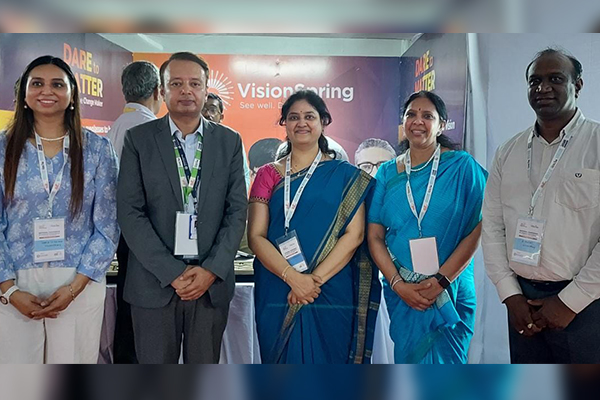Prema Chande, Principal of Lotus College of Optometry, talks about the importance of professional training to build a career as an optometrist
Optometry, as an arm of eye care studies, has gained great recognition in the last few decades. This recognition can fairly be accredited to the emergence of technology and of course, education that has helped give a fresh perspective to the previously family-dominated business. For instance, Reliance and Tata, the country’s leading business houses that were initiated by the determination of entrepreneurs are still sustaining because the once family-dominated business chose to opt for professional training to take the road ahead instead of just relying on the knowledge passed on from father to son. Even the business of optometry has the potential to experience a major transformation as more and more professionally trained optometrists join the workforce, even from the family.
An excellent example of how professional training is helping in the transformation of the business of optometry is the way Lawrence and Mayo is taking its business ahead. In the domain of eyewear since 1877, the administration in this business has changed hands many a times in the last few decades. However, the new crop of leaders that are spearheading the company bring with them the knowledge of professional training that is helping fuel the growth story in a better way. There are many other families pursuing the business of optometry who are gradually acknowledging the importance of professional training for their successors in order to secure the growth potential of their firm.
The Origin
Interestingly, the first spectacle frames were made in Europe. Made of leather and wood, these frames also laid the foundation of designing in eyewear. This detail also highlights the fact that the profession of optometry actually evolved from various occupational groups such as jewellers, sight-testing opticians and watchmakers.
There are several myths regarding the evolution of optometry as a full-fledged profession. However, irrespective of the legends, one can safely assume that optometry assumed its independence as a full-fledged profession sometime around the late 13th century in Italy, when the first pair of spectacles was said to have come into existence. By 1300 AD, spectacle manufacturing businesses were thriving in several parts of the world. Back then, optometry was clearly a family run business with the talent being passed on from father to son. In fact, there were very few places where people could get spectacles and so the need for vision testing was almost non-existent. For instance, the McAllister family was the first to venture into the business of optical frames in America and for quite sometime remained the only provider. Gradually, the art was passed on and soon, it became a burgeoning profession, all over the region.
Introduction of professional courses
Gradually, the fast paced evolution of this science led to the introduction of professional courses targeted towards those who wanted to understand the science of optometry and build their careers in this domain. Worldwide, optometry is being taught through several courses, with the four year integrated course being the most popular choice, internationally. Globally, optometry’s evolution as a professional course had started early. But in India, a major step in this direction was taken when the government introduced a two year Diploma in Optometry as a part of the country’s National Program for Control of Blindness. This was followed by the introduction of the first official four year program by Elite School of Optometry, 30 years later. Today, ASCO India (Association of School and Colleges of Optometry in India), lists more than forty members.
The growing number of institutes also indicate the evolution of optometry as a profession and the pivotal role that
educational training is playing in order to fuel this development. The professional training options being offered include four year programs as well as advanced programs leading to Masters in Optometry and doctorate level programs. In India, those pursuing the study of optometry can also choose to specialise in the areas of vision therapy, low vision rehabilitation, paediatric eye care as well as research and public health, after graduation. The coming of professional courses has contributed positively towards the evolution of the industry as well as the business practice.
The Indian perspective
As compared to its international counterparts, the Indian optical industry is still in its nascent stage. However, the growth is happening. As a result of the heavy duty marketing and exposure that the industry has received, people from different walks of life are showing a keen interest to build a career in optometry. This has also helped in the overall upliftment of the industry by raising the standards of practice.
Even veterans from the Indian optical community are voicing their opinion in favour of the growing importance of professional training with Snehal Turakhia, owner of the Turakhia Opticians, Chennai, saying, “Two distinct academic trainings have significantly changed the way our industry works. One is of course the optometrists’ training and the other is people who have pursued Business Management before joining the optical industry. Optometrists have undoubtedly contributed in bringing significant improvement in eye care standards including dispensing, vision testing and contact lenses. Over the last few decades, opticians have gradually inducted the practice of optometry as an integral part of an optical shop. Secondly, many optical owners who did not have any formal education in these fields have opted to put the next generation in either Optometry or Masters in Business Management or both. These people have managed to bring a radical shift in the way business is conducted by adopting newer and innovative methods. This kind of dynamic shift has upped the competitive levels and resulted in a situation where everyone wants to contribute to uplift their standards in order to be in the race”. 
Currently, in India, there are many family run optical businesses. Some of these businesses have been around for decades and are now being run by second or even third generation family members. It is being increasingly seen that this new breed of business owners are qualifying themselves with an optometry degree before stepping into the arena. Needless to say, this only spells progress for the business and the profession.
As Anahita Dastur, owner of Baliwalla & Homi Pvt. Ltd., leading providers of eye care solutions in India, puts it, “I do believe that academic training helps in pursuing optometry as a career. Even from the business perspective, optometry is not something that can be learnt solely through hands-on training. When people with proper academic training join us, their qualification contributes to the growth of our business as well. Additionally, even the end customer receives improved level of eye care services as a result of the increase in qualified optometrists”.
With the multiple course options available to study optometry and its various facets, it is important for those who are planning to build a career in this domain to start early, by enrolling for the right training program. This adds the much needed leverage to their resume and ensures that they end up as valuable assets for the business when they join the industry at a later stage.












